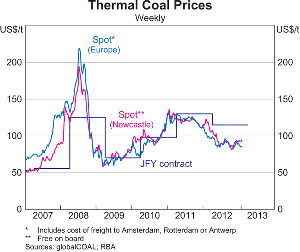Annual Japan - Australia thermal coal negotiations
|
This article is part of the Coal Issues portal on SourceWatch, a project of Global Energy Monitor and the Center for Media and Democracy. See here for help on adding material to CoalSwarm. |
| This article is part of the CoalSwarm coverage of Pacific Basin coal market. | |
| Key issues affecting the Pacific coal trade: | |
| Current major coal exporters: | |
| Potential coal exporters: | |
Australia's coal exports to Japan are largely based on long term contracts negotiated between Japanese power utilities and Australian exporters. Some of the major Japanese power utilities negotiate annual contracts with Australian suppliers for the Japanese financial year which runs from April to March. In 2011-12 Australian thermal coal exports to Japan were 70 million tonnes (in rounded figures) with a further 29 million tonnes to South Korea.[1]
Contents
Background on Japanese and South Korean thermal coal demand
Following the oil price spike in the early 1970's the Japanese power sector diversified away from reliance on oil-fired power stations to coal-fired power stations. Between 1990 and 2010 Japanese thermal coal imports trebled to 128 million tonnes in 2010. Between 2000 and 2011 thermal coal imports from South Korea doubled to 97 million tonnes.[2]
Japanese contract prices as a benchmark
Prices negotiated between Australian suppliers and Japanese customers are then adopted as a benchmark for long term contract prices by South Korean buyers. Australia-Japan thermal coal annual prices are usually broadly in line with trends in the spot price. The Reserve Bank of Australia notes that the Newcastle thermal coal spot price "is the benchmark price for most Australian thermal coal sold on shorter-term contracts" such as to China.[3]
2013 negotiations
Ahead of negotiations Platts reported that it had been estimated that Japan would import approximately 128 million million tonnes of thermal coal "of which about 60-70% or 77-90 million tonnes will originate from Australia."[4]
Prior to the commencement of negotiations it was widely agreed that there would be a substantial fall in the contract price. During the first half of 2012 Chinese coal demand had eased in line with slowing electricity demand and increased generation from hydro electricity. Industrial production and electricity demand in both Japan and South Korea was lower than anticipated.[3] A further factor was that the March 2011 tsunami not only triggered the Fukushima nuclear disaster but also damaged a number of coal-fired power stations and their coal infrastructure. Even though most nuclear power stations were shut down, it was gas fired power stations -- along with energy efficiency and renewables -- which expanded rapidly to fill the shortfall. (See The impact of the March 2011 Tsunami on Japanese coal plants for more details). Another factor was that Japanese utilities were under pressure to cut costs due to domestic controversy over their applications to increase electricity charges.
In early 2013 it was reported that the Japanese utility Tohoku Electric and coal company Xstrata would begin negotiations in early March for the 2013-2014 contract. Platts noted that while the 2012-2013 Newcastle thermal coal price had been $115 per tonne of 6,322 kcal/kg GAR coal, analysts expected the price to fall below $US100. Platts reported a Japanese utility source explaining that "he expects Tohoku to ask for a rollover of the October 2012 to September 2013 Newcastle thermal coal benchmark of $96.90/mt FOB."[4] At the start of the talks a Japanese utility source told Platts that he expected Xstrata to push for a contract price of over $100 and for Tohoku to ask for $95 a tonne.[5]
Ultimately, the contract was settled for $95, a drop of 17% on the previous years contract price but a $6.10 premium -- reflecting higher calorific values sought by the utilities - on the Newcastle spot price. One analyst told Reuters that "it's a big compromise (for Xstrata), I think. For suppliers, it's not a good number."[6]
Articles and resources
References
- ↑ Resources and Energy Quarterly March 2013, Bureau of Resources and Energy Economics, page 163.
- ↑ Ian Cronshaw, "An introduction to thermal coal markets", Resources and Energy Quarterly March 2013, pages 109.
- ↑ Jump up to: 3.0 3.1 Reserve Bank of Australia, "Box A: Thermal Coal Prices", Statement on Monetary Policy – February 2013.
- ↑ Jump up to: 4.0 4.1 "Xstrata, Japan's Tohoku to face off early Mar for 2013-14 thermal contract price talks", Platts, February 19, 2013.
- ↑ "Japanese utilities expect tough negotiations between Xstrata and Tohoku", Platts, March 4, 2013.
- ↑ "Xstrata, Tohoku set benchmark coal contract price 17 pct lower", Reuters, April 11, 2013.
Related SourceWatch articles
External resources
- International Energy Agency, World Energy Outlook 2012, International Energy Agency, November 2012. (Some limited information from the report is available for free. The whole report costs €120 (pdf version).
- International Energy Agency, Medium-Term Coal Market Report 2012 -- Market Trends and Projections to 2017, International Energy Agency, December 2012. (Some limited information from the report is available for free. The whole report costs €80 (pdf version).
- Ian Cronshaw, "An introduction to thermal coal markets", Resources and Energy Quarterly March 2013, pages 106-113.

